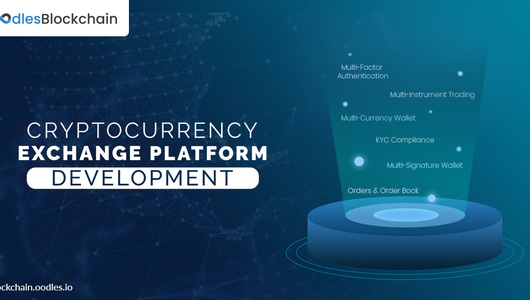-
Existing cryptocurrency exchange platforms often find it challenging to cope up with increasing market requirements such as efficient handling of large transaction volumes, advanced user-experience features, and smooth trading experience. The need of the hour is to develop simple and minimalistic crypto exchange platforms. They must support fast fiat withdrawals to include a large portion of the world population that deals in fiat money. Most importantly, they need to be safeguarded with high-level security to establish trust in the network. So, let's start with basic aspects to consider while developing a modern cryptocurrency exchange platform.
Cryptocurrency Exchange Platform: Architecture Essentials
The development of a cryptocurrency exchange platform must include these following four components. 1) The trading engine should always be at the core of any exchange. It provides access to the order book, matches buy/sell orders, executes transactions and calculates balances. 2) UI (user interface) or the outlook of your exchange website must be excellent, and user-intuitive. It is a window to how users see your exchange. Also, mobile accessibility should be at the top of the list as the majority of users use their smartphones to access the web. Fast and efficient mobile-optimized exchange platforms experience a better audience adoption rate. In a nutshell, the UI of the website should enable your users to;
- Register and access their account
- Deposit, view and withdraw cryptocurrencies and fiat currencies
- View existing order book, past transactions, stats, balances, charts, etc
- Place sell and purchase orders
- Enable access to the support mechanism
3) An efficient cryptocurrency wallet stores and manages cryptocurrencies on the exchange server with maximum security. For any exchange platform to prevent hacks it must have a hot/cold crypto wallet system to diversify risk. (explain wallets in detail) 4) An advanced admin panel is necessary for exchange platforms. It works like business intelligence and management software. Necessary Admin Panel Features
- Alteration of liquidity
- Option to edit the spread and trading
- Approval of user accounts for trading, after the verification of KYC and other regulatory requirements
- Management of currencies like BTC, USD, ETH, etc. and exchange pairs like USD/BTC, BTC/ETH, etc
- Crediting fiat deposits, debiting fiat withdrawal requests of users
Security Considerations
Google Two-Factor Authentication Google 2FA ensures that only valid users get access to the accounts created on the exchange. It requires two-factor authentication at every login and withdrawal request to protect the platform Encryption and Authorization System Both encryption and authorization are critical for a cryptocurrency exchange to keep track of user activities on the platform. Hot Wallet Protection The use of multiple private keys rather than a single private key prevents wallet attacks.
Robust features
KYC/AML Verification An exchange should be equipped with AML and KYC Checks, and customer document verification and management system to eliminate frauds. Strengthened Security The platform must adhere to security protocols defined by blockchain technology, and enhance the quality and accuracy of data. API and Liquidity Integration APIs and liquidity integration ensures that you get regular estimates of trading activities in the crypto market. Also, they provide current trading activities being executed on the website. Order Book with Matching Engine It is a dashboard that provides details regarding order payments, balance tracking, withdrawal request, pending transactions, and much more. Multi-Sig Wallet Configuration Integrating multi-signature encryption configurations in hot, cold or frozen wallets manage traders' KYC and AML checks for regulatory adherence. Trade Chart and Market Data Trade charts provide a comprehensive view of every cryptocurrency on the platform with rational chart visual presentation. Market data reveals information like volume of trades at a specific time. Provision to Connect with Other Exchanges to Boost Liquidity Steady and smooth liquidity is a prominent factor that drives the success of an exchange platform. Most of the new exchanges operate without an order book and trading activity chart and keep loosing potential customers. Instead, it is beneficial to connect the platform with external exchanges than simulating these activities using dummy accounts. Overall, it boosts the liquidity and allows the platform to operate within a network of exchanges.
Additional Features of a Crypto Exchange Platform
Extensibility As the number of crypto users is increasing, the platform must be highly scalable in architecture. It should be modular in design and consist of API layers to integrate third party services. Utility Integrating intuitive dashboards with trade charts and market depth charts provides an engaging user experience. It is also important to keep signup and trading processes simple and intuitive. Advanced Exchange Software The platform must use highly customizable software with granular user access controls and provide platform setting access from the admin console. Further, smart contracts automate various exchange processes, which increases efficiency and reduces operational costs.
Looking for a Cryptocurrency Exchange Platform Development Company?
Employing an in-house team of crypto developers is not sustainable as compared to outsourcing crypto exchange development tasks. The benefits of hiring an offshore cryptocurrency exchange software development company are:
- It is cost-effective
- A dedicated team can evaluate multiple cryptocurrency development platforms to fulfill your business needs
- No need to estimate the cost of hiring employees, software, resources, etc.
- No need to estimate the time required for developing, maintaining, and continuously upgrading the platform

Our Offices
INDIA
Emaar Digital Greens, Sector 61,
Gurugram, Haryana
122011.
Welldone Tech Park,
Sector 48, Sohna road,
Gurugram, Haryana
122018.














